Should You Go into Business with a Friend?
You share similar passions and love spending time together. Is that the foundation of a killer company or a formula for disaster? MC asked Maria Cornejo and Marysia Woroniecka, the pals-turned-partners behind Zero + Maria Cornejo, the label of choice for smart, chic women who mean serious business.
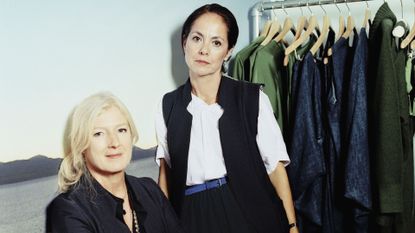
Whatever happened to "never do business with friends"?
MARIA CORNEJO: I'm not one for conventional wisdom. I founded my label in 1998, but after the 9/11 terrorist attacks, my Japanese backers pulled out and I couldn't afford to produce the line myself. I needed fresh ideas from someone who understood technology, since that was the direction the business was going. Marysia had worked in fashion PR for years — that's how we met — and had helped Prada and Gucci develop their e-commerce strategies. In the early '90s, she was the only one in fashion who knew how to send an e-mail. I called her up and said, "I need you!"
MARYSIA WORONIECKA: The Internet was completely revolutionizing retail. Maria's designs resonated with a particular client — the intelligent, independent woman who needed clothes for the office and for socializing — but she was selling only from her boutique. We had to broaden distribution immediately.
What did you do first?
WORONIECKA: We organized a small presentation in our downtown New York store to reintroduce our brand to key clients and the press. We each corralled all the industry contacts we'd built up through the years to fill the room.
CORNEJO: We were saying, "We're here. We have something to offer."
But you needed more than buzz to turn things around, right?
Stay In The Know
Marie Claire email subscribers get intel on fashion and beauty trends, hot-off-the-press celebrity news, and more. Sign up here.
WORONIECKA: God, yes. We had to convince editors and buyers that our garments would actually arrive in stores, on time, ready for sale. We launched an e-commerce channel, opened a second New York store and one in Los Angeles, and developed a customer retail database to track who was shopping and what they were buying. Many of our staffers started as interns — we hired the best full-time.
CORNEJO: We also increased personal appearances at shops around the country, to connect with women.
Did you have a business plan?
WORONIECKA: Absolutely. If you don't have an MBA or a firm grounding in business, you need to bring in someone who does, even if it's just in an advisory role. Our business plan gets more detailed and structured as we grow; our projections take the company through 2018 — new products, new stores.
How does the partnership work? Who does what?
WORONIECKA: I focus on operations — finances, sales and marketing, press and client outreach.
CORNEJO: I've handled numbers before, but I can't do that and design five collections a year. Sometimes I need to go for a walk for inspiration.
Michelle Obama is a regular customer. How did that happen?
CORNEJO: Ikram, a high-end Chicago boutique where the first lady shops, carries our line. I found out she'd bought something only after I saw a campaign picture of her in one of our black jersey dresses. And at one of her first official events for the White House Council on Women and Girls, she wore our bright violet suit. It was a thrill to have proof that the women who wear our clothes have such depth. Maggie Gyllenhaal, Chelsea Handler, Tilda Swinton, and Sofia Coppola are other clients. They're all risk takers but never look like they're in costume.
What if you two disagree? Who makes the final decision?
WORONIECKA: Occasionally, I need to persuade Maria that, for example, the buyers love her harem pants but want us to remove some volume from the butt. I also insist on sleeves, because customers from the Midwest to the Middle East want them.
CORNEJO: Little criticisms can make me cranky, but I'm my own toughest customer. I'll tweak a dress for hours on a mannequin, decide it's better off bias-cut, and move seams around until I love it. I worked and worked on the black silk Mei dress from our resort collection. It has volume, but you can belt it; it fits everyone differently, but in a flattering way. It's a best seller.
There are more female designers today than ever, but at many of the established brands — Céline, Gucci, The Row — the CEOs are men. Maria, did you think about gender when you brought in a partner?
CORNEJO: Marysia's as tough as any man. But men can be competitive about success. Women share in the triumphs. And we multitask better.
You're both married. Do you make it home for dinner?
CORNEJO: Most nights. We concentrate at work so everyone leaves at a decent hour. The office rule is no online shopping, no Facebook. Get your work done and leave. No photo shoots on Sunday.
Running a fashion line, is there pressure to represent the brand?
WORONIECKA: It's good business to wear something from a current collection. Of course, whenever there's a big event, we text each other to make sure we're not wearing the same thing!
What's the biggest drawback to working with a best friend?
CORNEJO: We're so busy that we don't get to just hang out. It's hard not to talk business all the time. We try and fail.
WORONIECKA: We actually look forward to taking business trips so we can relax, go swimming, and catch up — just the two of us.
-
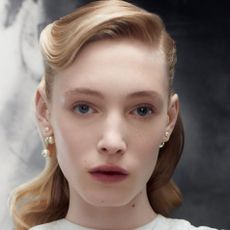 Bitten Lips Took Center Stage at Dior Fall 2024 Show
Bitten Lips Took Center Stage at Dior Fall 2024 ShowModels at the Dior Fall 2024 show paired bitten lips with bare skin, a beauty trend that will take precedence this season.
By Deena Campbell Published
-
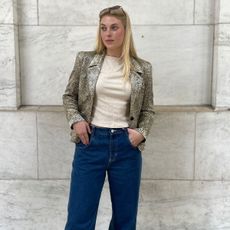 30 Spring Items That Solve My Expensive-Taste-on-a-Humble-Budget Dilemma
30 Spring Items That Solve My Expensive-Taste-on-a-Humble-Budget DilemmaSee every under-$300 spring item on my wish list.
By Natalie Gray Herder Published
-
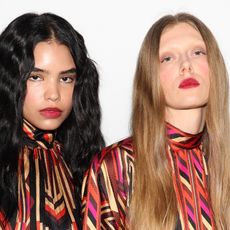 Your Makeup Won't Budge With These Setting Sprays
Your Makeup Won't Budge With These Setting SpraysPrepare for 12-hour wear.
By Sophia Vilensky Published
-
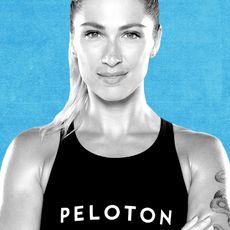 Peloton’s Selena Samuela on Turning Tragedy Into Strength
Peloton’s Selena Samuela on Turning Tragedy Into StrengthBefore becoming a powerhouse cycling instructor, Selena Samuela was an immigrant trying to adjust to new environments and new versions of herself.
By Emily Tisch Sussman Published
-
 This Mutual Fund Firm Is Helping to Create a More Sustainable Future
This Mutual Fund Firm Is Helping to Create a More Sustainable FutureAmy Domini and her firm, Domini Impact Investments LLC, are inspiring a greater and greener world—one investor at a time.
By Sponsored Published
-
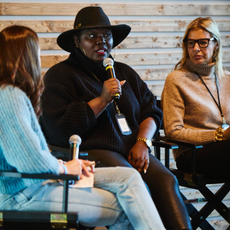 Power Players Build on Success
Power Players Build on Success"The New Normal" left some brands stronger than ever. We asked then what lies ahead.
By Maria Ricapito Published
-
 Don't Stress! You Can Get in Good Shape Money-wise
Don't Stress! You Can Get in Good Shape Money-wiseYes, maybe you eat paleo and have mastered crow pose, but do you practice financial wellness?
By Sallie Krawcheck Published
-
 The Book Club Revolution
The Book Club RevolutionLots of women are voracious readers. Other women are capitalizing on that.
By Lily Herman Published
-
 The Future of Women and Work
The Future of Women and WorkThe pandemic has completely upended how we do our jobs. This is Marie Claire's guide to navigating your career in a COVID-19 world.
By Megan DiTrolio Published
-
 Black-Owned Coworking Spaces Are Providing a Safe Haven for POC
Black-Owned Coworking Spaces Are Providing a Safe Haven for POCFor people of color, many of whom prefer to WFH, inclusive coworking spaces don't just offer a place to work—they cultivate community.
By Megan DiTrolio Published
-
 Where Did All My Work Friends Go?
Where Did All My Work Friends Go?The pandemic has forced our work friendships to evolve. Will they ever be the same?
By Rachel Epstein Published